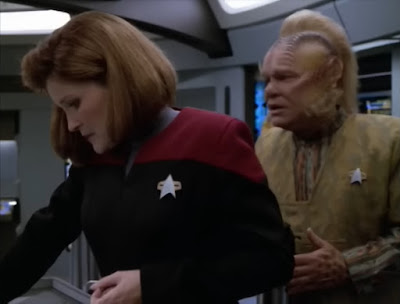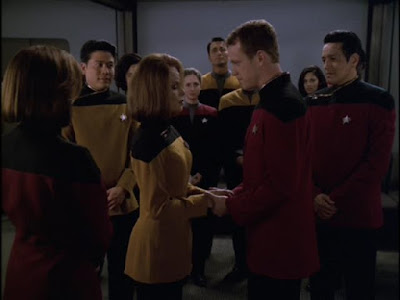 |
| Seven becomes convinced of a conspiracy theory. |
Original Air Date: Nov. 24, 1999. Written by: Joe Menosky. Directed by: Terry Windell.
THE PLOT:
In the interests of increased efficiency, Seven of Nine has installed a cortical processing subunit in her alcove. This will allow her to download Voyager's data as she regenerates, effectively letting her "learn while sleeping." This initially seems to work out, with Seven able to pinpoint a minor insect infestation by drawing conclusions from related pieces of information.
At the same time, Voyager encounters Tash (Albie Selznick), an alien who was also displaced by the Caretaker. Tash has built a space catapult to send him home - technology that Voyager can use to cut time off its voyage as well. Janeway agrees to assist with final repairs, with the understanding that she can use it after Tash takes his journey.
Seven's next regeneration allows her to identify the catapult as using a tetryon reactor, the same type of technology used by the Caretaker. Tash reluctantly admits to this. The revelation doesn't really change anything, and the alien makes his test flight the next day.
Seven, however, becomes fixated on the idea that Tash's reactor is not just the same type of technology, but the same reactor that was used by the Caretaker. She contacts Chakotay and asks to speak with him privately. While regenerating, she has analyzed "over thirty million teraquads of data," leading her to one inescapable conclusion. Voyager isn't in the Delta Quadrant by accident. Janeway stranded the ship here on purpose, as a prelude to a large-scale invasion by Starfleet!
CHARACTERS:
Capt. Janeway: Though she's eager at the prospect of shaving years off the voyage home, she doesn't ignore Seven's warnings that Tash's catapult uses Caretaker technology. She's ready to pull out of her deal with Tash if he doesn't provide details - but once he's given reasonable explanations both for the technology and for why he lied about it, she is satisfied and continues assisting him. She's supportive of Seven's alcove alterations, particularly after Seven is able to demonstrate the advantages of processing data so quickly.
Chakotay: The episode is bookended by scenes of him having dinner with Janeway, which shows how relaxed they've become around each other over the past five years. He's initially dismissive of Seven's claims about Janeway. When Seven continues bringing up the captain's stranger past decisions, however, he decides it's worth investigating. Even then, he limits himself to sharing the suspicions with B'Elanna, his most trusted former crew member. Oh, and being blatantly obvious in his wariness of Janeway until the misunderstanding is cleared up.
Seven of Nine: Jeri Ryan has some fun playing Seven the bonkers conspiracy theorist. As she lays out her "evidence" to Chakotay, she paces back and forth, agitated, shouting out dates and incidents as if each is a smoking gun rather than just a stray bit of data that she's selected to fit her pattern. By the point she's accusing young Naomi Wildman of being in on it - even asking who the child is working for - she's reached the stage of full paranoid delusion. I half expected her to start ranting about fluoride in the ship's drinking water.
THOUGHTS:
The Voyager Conspiracy is the series' X Files style "conspiracy" episode, with Seven of Nine thrust into the Fox Mulder role. Obviously, there's no chance that the viewer will ever buy into her increasingly convoluted theory, but it does allow writer Joe Menosky to play with some of the bizarre decisions Janeway and her crew have made over the years. I'm surprised Seven didn't fold in Janeway's botching of a path home in False Profits, though, as that would practically qualify as a smoking gun.
Menosky structures his story well. Seven's new alcove is introduced in the teaser, as she explains its workings to Naomi Wildman. This scene also emphasizes how Seven has changed since her introduction by reminding us of the bonds she's made with the people on Voyager. Can you imagine early Season Four Seven making time for a weekly board game with a child?
Her first use of the alcove sets up the rest of the episode. She wakes up from her regenerative cycle and urgently contacts someone to speak to them - in this case, B'Elanna; in later cases, Janeway and Chakotay. She believes there is an insect infestation inside the ship's sensor network, and she quickly relates the many individual pieces of data that led her to that conclusion. The crew checks the sensor node, and the insects are indeed there. Both viewer and crew sees that the alcove works, and that Seven draws conclusions from multiple individual pieces of information.
Her second use alerts Janeway to Tash's use of a tetryon reactor in his catapult. Seven is again correct. At the same time, the viewer sees her fixating on the idea that this is the same reactor the Caretaker used. We recognize that she's starting to behave irrationally, but the crew has mostly just seen that her alcove has twice delivered correct conclusions. This helps to sell Chakotay taking her seriously when she accuses Janeway in the second half.
Structurally, this is all sound, but I think the episode takes a little too long to reach the accusation. There's dramatic potential in making Janeway and Chakotay suspicious of each other. I appreciated that Chakotay confided in B'Elanna, his most trusted former crew member, but I'd have liked to see this taken further than just B'Elanna snapping at Harry (who's probably so used to that sort of thing by now that it likely didn't even register).
I think the episode makes a fundamental error in making its main character Seven instead of focusing more on Janeway and Chakotay. The real interest isn't in watching Seven turn into a ranting conspiracy theorist, but in seeing Janeway and Chakotay take her seriously. I'd love to see that amount to more than a few sideways looks. Chakotay confides in B'Elanna; maybe go further, with the crew starting to take sides. As it stands, the whole thing is reduced to a sitcom-level misunderstanding that's resolved far too quickly and easily.
I will say that I like the climax, with Janeway attempting to talk Seven down from her mania. Janeway appeals to Seven by mimicking her own "evidence" of rattling off stardates and events that happened on those dates. Unlike Seven, she draws on key emotional moments, milestones in the ex-Borg's evolving humanity and in their personal relationship, and there's a decent emotional tug there.
OVERALL:
Despite my issues with it, The Voyager Conspiracy is well-structured and highly watchable. For the second episode in a row, I think dramatic potential is left untapped by a decision to focus on Seven when there was more interest in seeing the other characters' reactions. Still, judged on its own merits, this is enjoyable, even if I think it had the potential to be a lot more.
Overall Rating: 6/10.
Previous Episode: One Small Step
Next Episode: Pathfinder
Review Index
To receive new review updates, follow me:
On BlueSky:
On Threads:














